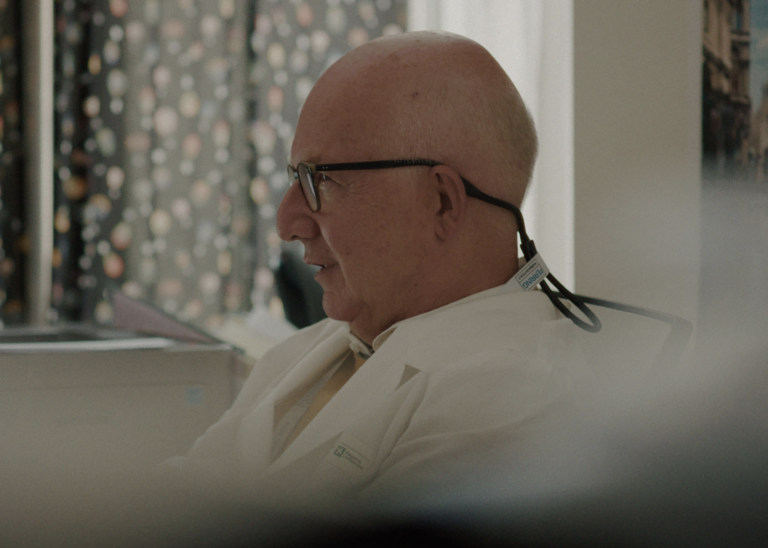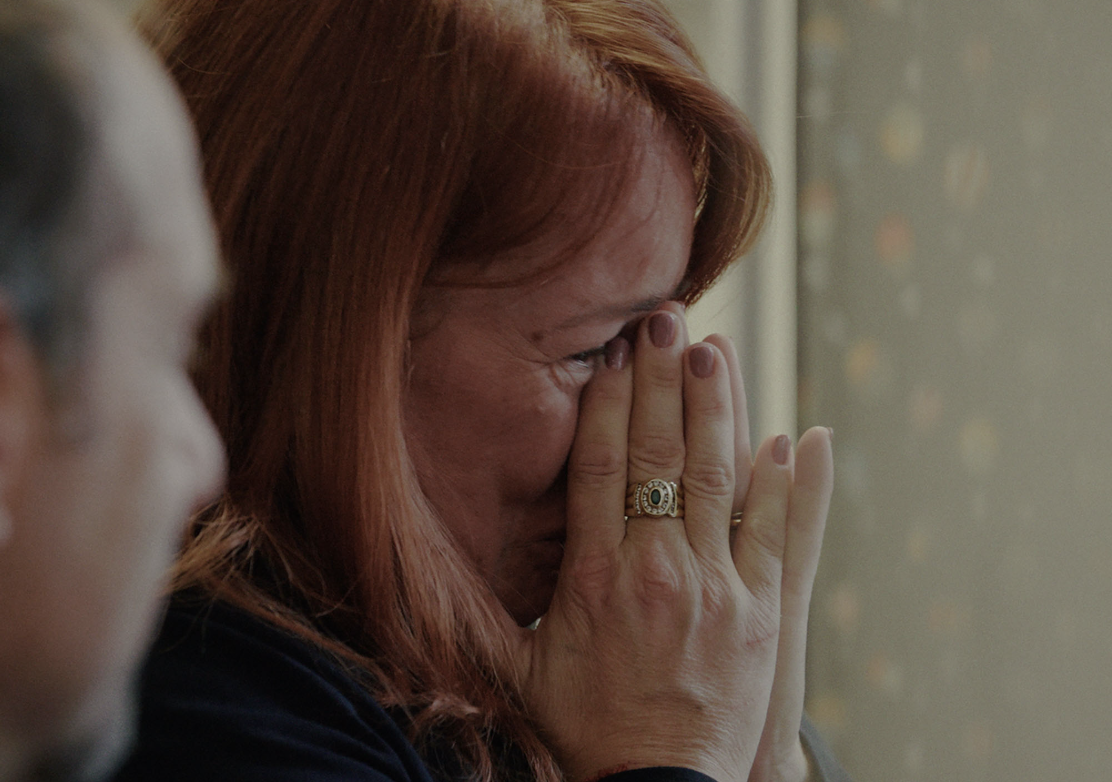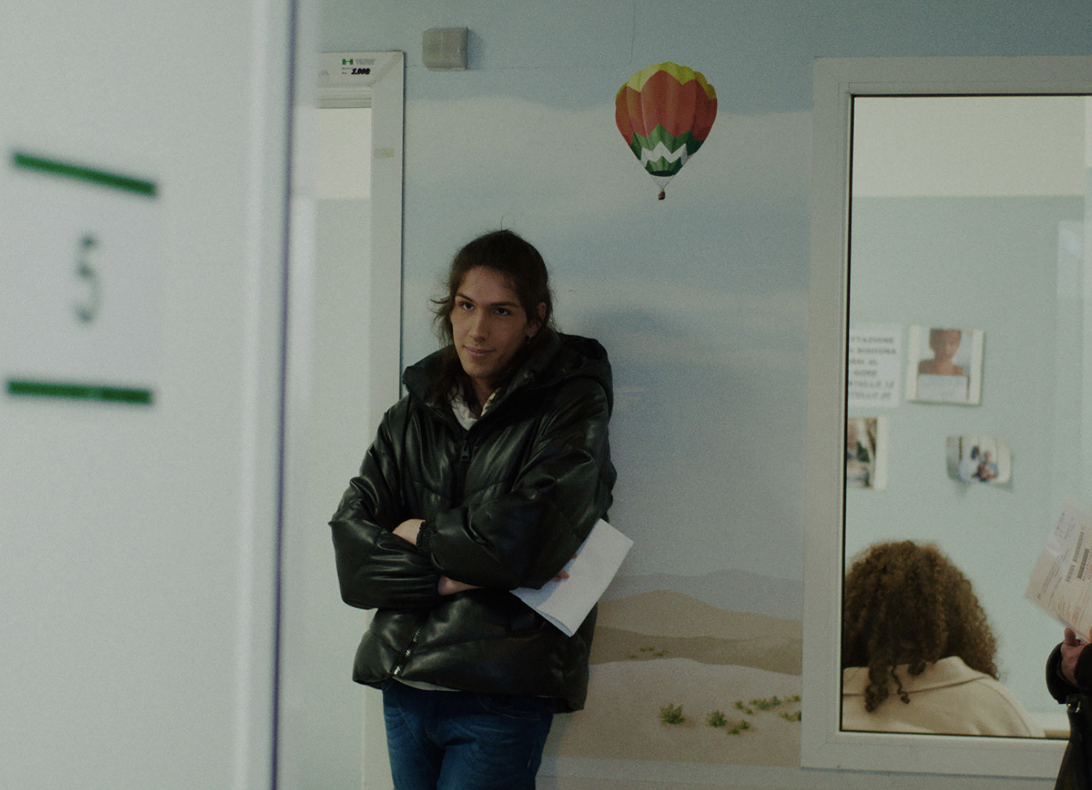
©Courtesy of Ballota Films
Gen_: At Milan’s Niguarda public hospital, the unconventional Dr. Bini leads a bold mission overseeing aspiring parents undergoing in vitro fertilization and the journeys of individuals reconciling their bodies with their gender identities. He navigates the constraints set by a conservative government and an aggressive market eager to commodify bodies.
In a politically charged environment where an individual’s reproductive rights and gender expression are often discussed in the abstract, it is easy to be distracted from the reality that in vitro fertilization and gender-affirming surgeries are medical procedures conducted by professionals working with deep scientific knowledge. In one of the few public hospitals in Italy allowed to provide this kind of care, Dr. Maurizio Bini and his team meet with a diverse group of patients who need medical intervention in order to lead healthy, purposeful, and meaningful lives. With rare access and an intimate cinematic style, we see the profound emotional and physical care that Dr. Bini and his colleagues bring to their work in corporally realizing the dreams of people to bear children or transition to their true identity.
Director : Gianluca Matarrese
Screenwriters : Gianluca Matarrese, Donatella Della Ratta
Producers : Dominique Barneaud, Donatella Palermo, Alexandre Iordachescu
Production Companies : Bellota Films, Stemal Entertainment, Elefant Films
Edited by : Giorgia Villa
Music by : Cantautoma
Camera by : Gianluca Matarrese
Sound Recording : Gianluca Matarrese
Additional Camera : Beniamino Barrese, Mattia Colombo, Jacopo Loiodice
Color Grading : Diego Diaz
Sound Mixer : Denis Séchaud
In Association with : France Televisions, RTS Radio Télévision Suisse SRG SSR
Year : 2025
Category : Feature
Country : France/Italy/Switzerland
Language : Italian
Run time : 104 min
Company : Bellota Films

Exclusive Interview with Writer/Director Gianluca Matarrese
Q : I really find it fascinating about Dr. Maurizio Bini. How did you get to know him initially? And how did this project start?
Gianluca Matarrese : For me, films are encounters. This film wasn’t my idea. The idea came from one of my good friends Donatella Della Ratta. She’s co-writer of this film and she’s a professor in the John Cabot University in Rome. She was into anthropology and media studies, and she was planning to write a book about hormones for transition treatments and fertility, what’s behind the market. And her gynecologist in Rome advised her to meet Dr. Bini, telling her he would be a very good character for study or observation.
As soon as she met him, she knew me very well, and she told me, “I think you should go with me. This would be a very good story about this practice and this person. So we started from day one, I arrived with the camera and met the doctor. From the first day, I knew there was a film there. And I kept going.
I found many things that related to me that I also care about, it was an encounter by chance, and that’s happened all the time in my life, many films happen the same way. So we started from day one, and for a year, we kept going and the narrative and structure of the film came. The intention of the film was clear from the beginning, it had to be the relationship between the doctor and the patient.
It wasn’t the power stories of the patients, neither of the doctor. That’s another film. It’s what happens in the exchanges and this care that the doctor is showing towards humans and people with dreams related to their bodies.
Q : What’s engaging about this film is the characteristics of Dr. Bini. You know, between a patient and even the patient’s family opens up in front of Dr. Bini. He seems connected with the patient. What are the characteristics of his practice that stood out for you?
Gianluca Matarrese : The main thing for me is to see a doctor that everybody should have or you will love to have, because it’s very rare to find a doctor with human connection with the patient, even if it’s not perfect and politically incorrect, borderline. Sometimes he says things very up-front with patients because it comes from another generation as well, but it’s really doing what is good for the patient, no matter what, even if it’s something that you have to come up with to make it legal, even if it’s not. So it has to deal with the flexibility of legalism and procedures, a lot of administrative procedures. So he finds a solution that is good for the patient. Sometimes, what it’s not good for the patients is not what is legal.
So I think it is very important that this is the true calling for the doctor. And in the film you also see he’s transmitting and passing his knowledge to this new doctor, the future doctor that she will take over. And you understand that the generations are not the same. But the experience that he has gained over the years is really, really important.
So I think the characteristics of Dr. Bini that fascinated me, the fact that he really can find in every different case for the right solution. Because they’re(Patients) very complex. Sometimes things are really specific for every person. The dream is not the same for each person.
Sometimes you think it’s too extreme, it’s not right for the person, or sometimes the person is pushing too hard or they don’t have the instruments, so it’s hard to understand when this is a good thing or not for the patient.
And this is where I was really surprised when I was observing this because you can have your prejudice, oh, this is too much going too far. And sometimes you’re like, oh, the same thing for this person, well, it’s right. Because this person is really in pain, it’s something that is a matter of life and death.
For another patient, it’s just something that goes with a caprice. Something that it’s not really related to your happiness or your pain. Sometimes you really see how hard it is for the doctor to understand, if it is a real need or not a real desire or just something from other things, such as parents or other issues, traumas the needs are the same, but not for everyone, they have the same meaning.
Q : I’m curious to know that since the Italian Prime Minister, Giorgia Meloni became the first woman to hold the position, she’s Catholic and very conservative. What are the changes on the reproductive field, particularly on January 1st, Italian laws set the age limit for 44 ART(Assisted Reproductive Technology)?
Gianluca Matarrese : F As far as our production, we didn’t have big support from Italy but we had support from France and Switzerland. I mean Italian main national networks didn’t really want to hear about these topics.
And talking about politics, let’s say the oppression and the repression is getting bigger and bigger because the politics really are oriented for the traditional family that involves. Of course, all the practices for procreation, especially as you heard, it’s a universal crime, for example, to have a surrogate pregnancy in Italy, you can’t even do this abroad, you will be persecuted.
And then, for queer people, it’s really hard to go on procedures for fertility. So you have to go around the law and maybe pretend that you have a wife or she’s just a daughter, so you have to find a way as you can imagine. Then for the transition for trance, now it’s getting very hard for minors because we have the prescription for beta blockers that blocks the effects for puberty, but now they are trying to change that too..like I think happens in some states in the United States while in Germany, it’s the opposite.
That’s why I wanted to start the film with this universe like it was “Star Wars” and every country is a different state in a different continent or state in our world. And there are interceptions of the rules in every world. And this is like a spaceship. This place in Italy is like a spaceship where a miracle is happening.
Because it’s a very oppressive and conservative country in a catholic region, Lombardia. Despite this spaceship, this little miracle place, it’s the place where everything happens the way it should happen. Because it’s free of charge and you have a good doctor. So it’s really a typical place. Especially for the environment surrounding this spaceship.

©Courtesy of Ballota Films
Q : Could you talk about Dr. Bini’s staff? He and his teammate(other doctors and Therapists) talk about the extended medical history of the patient in detail. You can see how they care about patients from the staff perspective. Dr. Bini seems to really deal with a lot of patients on a daily basis. So, there is a lot of work that also relies on the staff as well. So talk about how they collaborate with the staff and to execute daily jobs.
Gianluca Matarrese : This is a good question because in the four hour cut I had, I included more of his colleagues. The problem is that it was a different film. It wasn’t an observational film, kind of a Frederick Wiseman style. But it could work. If it’s like welfare, hospital, Wiseman’s film.
The Wiseman is the biggest in the world. I would never compare myself to that. But it’s like this film is not about the institution. So I didn’t put that in the film, Right. I don’t know if you hear me.
Even if I film the other colleagues, the therapist, if you follow the therapist, because of the procedure, you have to go through some therapy sessions for a while before taking hormone therapy. Then you take hormone therapy, once the judge decides, then you have the lawyer that will change your documents. And then when you change the documents on your paper, it’s because the judge decided so you can have all the operations free of charge.
So there’s a long procedure. And then we have a urologist that I filmed. She was an amazing woman feminist from Naples. But I saw she was taking care of the issues of fertility for men because in the couple there’s also the men. It’s not just a woman.
And we had other gynecologists. We had all the people in the laboratory. We have one of them. She’s in the film more than the other ones. She’s the main biologist. So it’s a really big, big team. They are lovely people, really committed and passionate. And there’s a good environment.
Sometimes, patients can be very hard, but they talk about the ethical issues or doubts they have very often. I witnessed and recorded some of these moments where they’re asking themselves about ethical issues, morals, ethics, religion, and so they ask themselves questions a lot, and this is something I think that happens all the time when you go into the private environment of professionals.
If I do that with lawyers, I would enter the room of a lawyer without a client, or if you do that with bankers or chefs, it will be the same thing. So, it’s a privileged gift and generosity they gave me access to this private space.
Q : Right. I’m curious to know, with Donald Trump’s second inauguration as the president. There’s a growing movement among the United States that, you know, ban or regulate abortion, which has been widely recognized as a woman’s rights in the United States. But in fact, since the Trump victory in the election, they have been moved to tighten the regulation as well. How do you see the current situation in the United States from a European perspective?
Gianluca Matarrese : F For me, it’s hard to say because I’m not a politician. I’m not good at economics. Even though I made the film, it’s hard for me to make political statements and I don’t think this is a militant film, but it’s a political film because intimacy is political. But I think what we are showing in this film is a possible vision of a world. It’s a choice of a world where the state is actually taking charge of patients, while against another vision of the world where the individual is left alone and the one who has more money can have it be taken care of and the one who has a louder voice can be heard.
So I will love this film. Give you an example of what public service could be. What this choice of a world could be, against another choice of another kind of world where the strongest and the richest is going further. And he’s so I don’t know what will happen in the United States.
I heard in Canada, they’re trying to go like the United States for the health care system. So, of course the world is going conservative all around the world. Even in France now, we don’t know what’s going to happen with the new election. But France is still a state oriented country. So it’s a hard question. I don’t know how to answer that. I’m just saying that this is an example of a celebration of public service and what a doctor and hospital should be.
For me, it’s hard to say because I’m not a politician. I’m not good at economics. Even though I made the film, it’s hard for me to make political statements and I don’t think this is a militant film, but it’s a political film because intimacy is political. But I think what we are showing in this film is a possible vision of a world. It’s a choice of a world where the state is actually taking charge of patients, while against another vision of the world where the individual is left alone and the one who has more money can have it be taken care of and the one who has a louder voice can be heard.
So I will love this film. Give you an example of what public service could be. What this choice of a world could be, against another choice of another kind of world where the strongest and the richest is going further. And he’s so I don’t know what will happen in the United States.
I heard in Canada, they’re trying to go like the United States for the health care system. So, of course the world is going conservative all around the world. Even in France now, we don’t know what’s going to happen with the new election. But France is still a state oriented country. So it’s a hard question. I don’t know how to answer that. I’m just saying that this is an example of a celebration of public service and what a doctor and hospital should be.
Q : One of the patients plays the violin in front of the patient. I thought it was an interesting way to calm the patient’s mind or soothe their mind. Could you talk about shooting that experience, how they set it up?
Gianluca Matarrese : F He’s a real patient and he really wanted to do that while his wife was going to the procedure. And that’s kind of poetic sometimes back can help, you know, they do that for milk, for cows and it’s something you could help the embryo, To the egg to be fecund. So it’s very poetic. It happens for real, not staged.

©Courtesy of Ballota Films
If you like the interview, share your thoughts below!
Check out more of Nobuhiro’s articles.
Meet the Artist 2025: Gianluca Matarrese on “GEN_”

